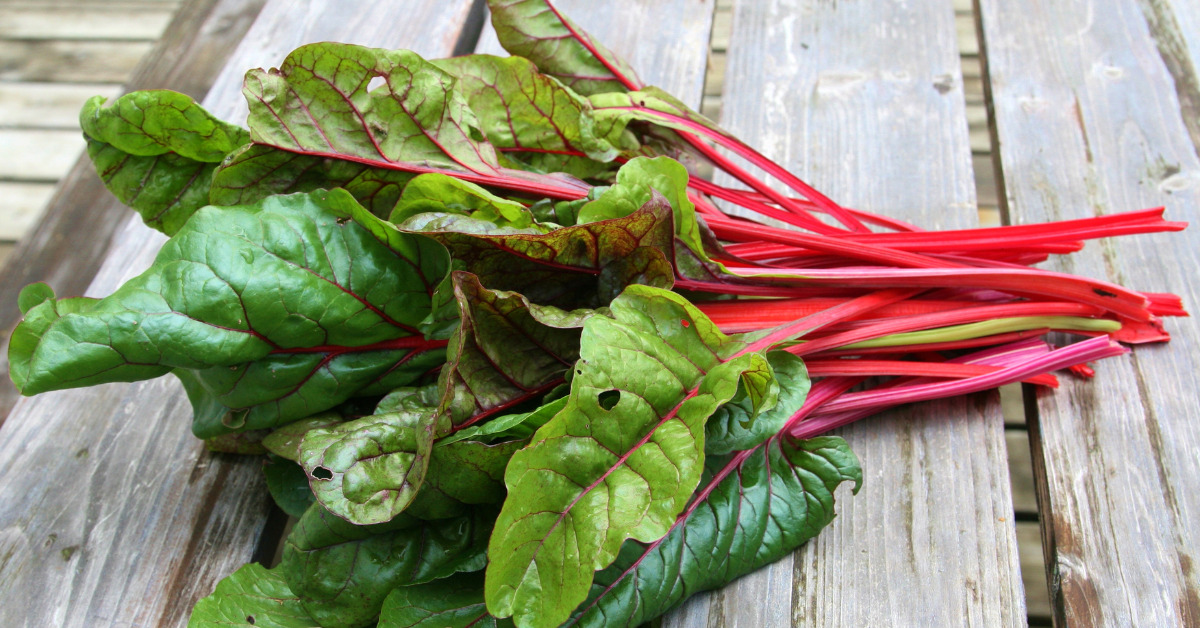
Can we talk for a quick sec about chard?
Don’t pass this beauty by in the produce section!
Coming from the same plant family as spinach and beets, chard is a green leafy vegetable and one of nature’s superfoods. Some call it Swiss chard (although it didn’t originate in Switzerland) or rainbow chard (because its stalks can be green, yellow, or bright pink).
Here are some of its incredible health benefits:
🥬 Excellent source of vitamin K—for blood clotting and healthy bones
Chard boasts a notable concentration of Vitamin K, a nutrient essential for various bodily functions. Vitamin K plays a crucial role in promoting blood clotting, which prevents excessive bleeding both internally and externally. It also has a significant impact on bone health. This vitamin supports the absorption of calcium, a mineral integral to bone strength and density. So, incorporating chard into your diet can contribute to both a robust circulatory system and stronger bones.
🥬 Good source of magnesium—for muscle relaxation and healthy blood pressure
Chard is rich in magnesium, a mineral that is vital for maintaining optimal health. Magnesium plays a critical role in over 300 enzymatic reactions within the body, including the metabolism of food, synthesis of fatty acids and proteins, and the transmission of nerve impulses. The muscles in our body, including the heart, require this essential mineral to relax after contraction. Furthermore, Magnesium aids in the regulation of blood pressure and can help prevent hypertension. By including chard in your diet, you’re not just treating your taste buds to a delicious green, but you’re also fueling your body with an important nutrient it needs to function smoothly.
🥬 Good source of vitamin C—to support body collagen and immune function
Chard is also a valuable source of Vitamin C, an essential nutrient that plays multifaceted roles in our body. Known for its antioxidant properties, Vitamin C aids in protecting the body against harmful free radicals, thereby reducing the risk of chronic diseases. It’s pivotal in the synthesis of collagen, a protein that contributes to the health and structure of our skin, hair, nails, and connective tissues. Moreover, it supports our immune system by stimulating the production of white blood cells, which are our body’s primary defense against pathogens. So, adding chard to your meals not only elevates their flavor profile but also fortifies your body’s overall health and resilience.
🥬 High in antioxidants—like beta carotene, lutein, and zeaxanthin
Chard is a veritable powerhouse of antioxidants, which are compounds known to combat oxidative stress and inflammation. Prominent among these antioxidants are beta carotene, lutein, and zeaxanthin. Beta carotene, which gets converted into Vitamin A in the body, is integral for maintaining healthy vision, immune function, and skin health. Lutein and zeaxanthin, on the other hand, are carotenoids that accumulate in the retina of the eye, where they protect against harmful blue light and reduce the risk of age-related macular degeneration. By incorporating chard into your diet, you are essentially equipping your body with a natural defense mechanism against various health disorders.
🥬 Rich in fiber—for healthy digestion and blood sugar control
Chard is loaded with dietary fiber, an integral component for maintaining a healthy digestion system. Fiber adds bulk to the diet, helping to prevent constipation and promote regular bowel movements. This leads to an overall healthier digestive system, reducing the chances of discomfort and serious illnesses such as colorectal cancer. Additionally, fiber plays a significant role in controlling blood sugar levels. It slows down the rate at which sugar is absorbed into the bloodstream, thus preventing sudden spikes and crashes in blood glucose levels. This makes chard an excellent food choice for individuals managing diabetes. So, by adding chard to your diet, you’re promoting a healthier digestion and better blood sugar control.
🥬 Contains vitamin E—for healthy skin and eyes
Chard is a rich source of Vitamin E, a powerful antioxidant that plays a vital role in maintaining the health of our skin and eyes. Vitamin E aids in protecting the skin against damage from free radicals and UV rays, promoting skin hydration and improving its elasticity. This leads to healthier, younger-looking skin. Moreover, it contributes significantly to eye health. Vitamin E, when combined with other essential antioxidants, can decrease the risk of age-related macular degeneration, a leading cause of blindness in older adults. Thus, by incorporating chard into your diet, you’re enhancing your skin’s health and aiding in the preservation of your eyesight.
Chard is often overlooked in favor of more popular leafy greens like spinach or kale. However, its impressive nutritional profile makes it a powerhouse vegetable that should not be ignored.
Chard has a mild flavor and is delicious sauteed or boiled. Just remember that the stalks are much thicker than the leaves and require a bit more cooking time to soften up.
Here are some recipes to try:
- Peruvian Chickpea and Chard Stew
- Spiced Greens
- Herb Winter Chicken and Vegetable Soup
- One Pot Italian Veggie Medley Stew With Salmon
🥬 In conclusion, chard is a nutritional powerhouse that offers numerous health benefits. From promoting healthy bones and circulation to supporting digestion and eye health, this leafy green should be a staple in everyone’s diet. With its mild flavor and versatility in cooking, there are endless ways to incorporate chard into your meals. Whether you’re looking for a hearty stew or a light sauté, chard is the perfect addition to any dish. So next time you’re at the grocery store, don’t pass up on this underrated superfood and reap all its amazing health benefits! So if you haven’t already, make sure to add some chard into your meals for a nutritious and delicious boost. Your body will thank you.







